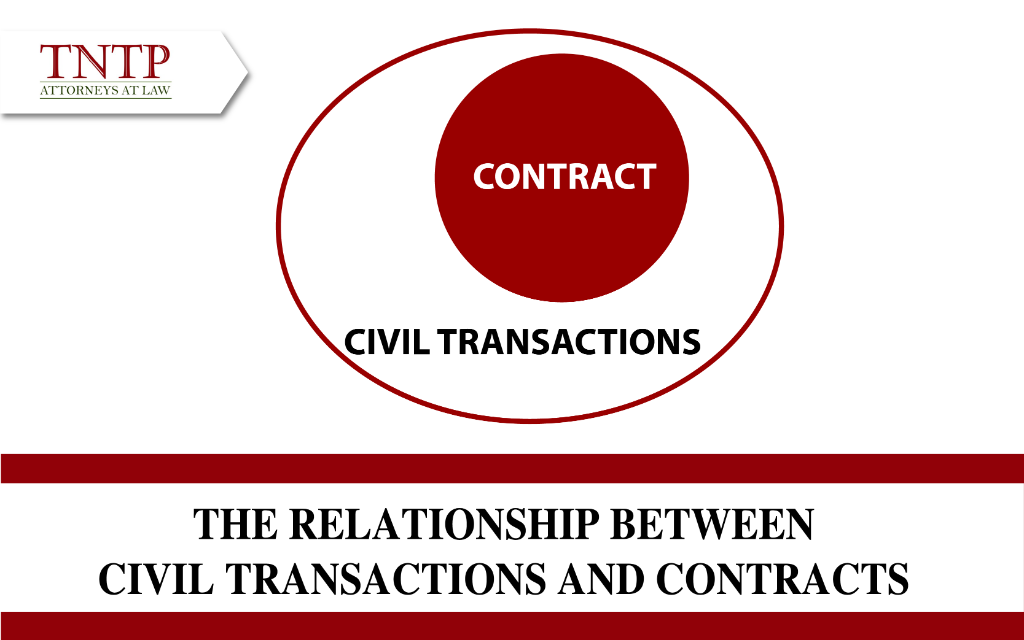The definition of civil transactions is similar to that of contracts. Accordingly, what is the relationship between civil contracts and transactions? In this article, we will analyze some aspects of civil transactions and contracts to clarify this relationship.
1. The definition of civil transactions
According to Article 116 of the Civil Code 2015, a civil transaction is a contract or unilateral legal act that gives rise to, changes or terminates civil rights and obligations. In which, a contract is an agreement and unification of the will of two or more parties that give rise to, change, or terminate civil rights and obligations such as sale contracts of property, contracts for the lease of property, etc. A unilateral legal act is a transaction that only shows the will of one party to give rise to, change, or terminate obligations such as wills making, the promise of a reward, prize competitions, etc.
Thus, according to the above definition, civil transactions have the following characteristics:
- Firstly, civil transactions always represent the will of the involved parties in the transaction. Whether expressed in the form of a contract or a unilateral legal act, a civil transaction is always a conscious act of the participating party in order to achieve certain goals and desires. Specifically, in case a civil transaction is a contract, it is the expression and unification of the parties’ will; in case of a unilateral legal act, it is the expression of the will of one party. Therefore, if a civil transaction has no expression of the will of the participating party, or there is an expression of the will, however, due to misunderstandings or as a result of compulsion, threat, or deception by other parties, such civil transaction is regarded
- Second, the purpose of a civil transaction is a legitimate interest, not against the social morality that the parties are aiming for. A civil transaction takes effect when the purpose of such transaction is proven or recognized to be lawful, not contrary to social morality. On that basis, the rights and obligations of the parties can be performed in reality.
- Third, the legal consequences of civil transactions are aiming for arising, changing, and terminating the rights and obligations of related parties. A civil transaction is an act of one or more parties toward the following legal consequences:
First, giving rise to civil rights and obligations: this is the case where a civil transaction establishes rights and obligations for the related parties in the transaction.
Second, changing civil rights and obligations: this is the case where rights and obligations between related parties are already available, afterwards, the parties establish a civil transaction to amend and supplement, accordingly, change one party’s rights and obligations as well as those of the other party.
Third, terminating civil rights and obligations: this is the case where rights and obligations between related parties are already available. Afterward, the related parties establish a transaction to terminate the existing rights and obligations.
2. Relationship between civil transactions and contracts
According to the definition of civil transactions in Section 1 of the article, it can be affirmed that a contract is a form of civil transaction. Civil transactions include unilateral legal acts and contracts. Unlike a unilateral legal act established solely by one party’s will, a contract is established by at least two parties. A contractual relationship includes pairs of parties, respectively, the obligee and the obligor. The rights and obligations of the parties are established depending on the specific type of contract.
Since civil transactions include contracts, the legal provisions governing civil transactions will also govern contracts. For example, a valid contract must also comply with all the conditions specified in Article 117 of Civil Code 2015 as below:
i) Participants in the contract have a legal personality and/or legal capacity in conformity with such contract.
ii) Participants in the contract act entirely voluntarily.
iii) The purpose and content of the contract are not contrary to the law and/or social morality.
iv) The form of the contract shall be the condition for its effectiveness in cases where it is so provided for by law.
According to Chapter XVI of the Civil Code 2015, some common types of contracts include sale contracts of property, contracts for exchange of property, contracts for loan of property, contracts for gifts of property, contracts for lease of property, contracts for borrowing property, contracts for services, transport contracts, processing contracts, contracts for bailment of property, authorization contracts, cooperation contracts and contracts of land use rights.
Above is the article “The relationship between civil transactions and contracts”. We hope this article is useful to you.
Sincerely,







